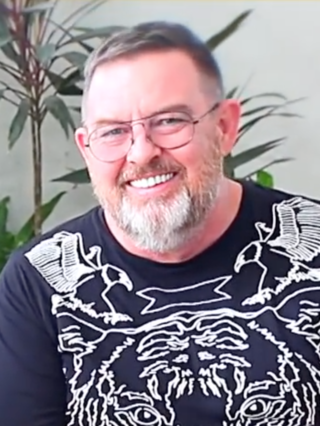
A conspiracy theory is an explanation for an event or situation that asserts the existence of a conspiracy, when other explanations are more probable. The term generally has a negative connotation, implying that the appeal of a conspiracy theory is based in prejudice, emotional conviction, or insufficient evidence. A conspiracy theory is distinct from a conspiracy; it refers to a hypothesized conspiracy with specific characteristics, including but not limited to opposition to the mainstream consensus among those who are qualified to evaluate its accuracy, such as scientists or historians.

James Patrick Caviezel Jr. is an American actor. He played Jesus in The Passion of the Christ (2004), Tim Ballard in Sound of Freedom (2023), and starred as John Reese on the CBS series Person of Interest (2011–2016). He played Slov in G.I. Jane (1997), Private Witt in The Thin Red Line (1998), Detective John Sullivan in Frequency (2000), Catch in Angel Eyes (2001), and Edmond Dantès in The Count of Monte Cristo (2002).

The Epoch Times is a far-right international multi-language newspaper and media company affiliated with the Falun Gong new religious movement. The newspaper, based in New York City, is part of the Epoch Media Group, which also operates New Tang Dynasty (NTD) Television. The Epoch Times has websites in 35 countries but is blocked in mainland China.

QAnon is a far-right American political conspiracy theory and political movement that originated in 2017. QAnon centers on fabricated claims made by an anonymous individual or individuals known as "Q". Those claims have been relayed and developed by online communities and influencers. Their core belief is that a cabal of Satanic, cannibalistic child molesters is operating a global child sex trafficking ring that conspired against president Donald Trump. QAnon has direct roots in Pizzagate, an Internet conspiracy theory that appeared one year earlier, but also incorporates elements of many different conspiracy theories and unifies them into a larger interconnected conspiracy theory. QAnon has been described as a cult.

Cicada 3301 is the name given to three sets of puzzles posted under the name "3301" online between 2012 and 2014. The first puzzle started on January 4, 2012, on 4chan and ran for nearly a month. A second round of puzzles began one year later on January 4, 2013, and then a third round following the confirmation of a fresh clue posted on Twitter on January 4, 2014. The third puzzle remains unsolved. The stated intent was to recruit "intelligent individuals" by presenting a series of puzzles to be solved; no new puzzles were published on January 4, 2015. A new clue was posted on Twitter on January 5, 2016. Cicada 3301 posted their last verified OpenPGP-signed message in April 2017, denying the validity of any unsigned puzzle.

8kun, previously called 8chan, Infinitechan or Infinitychan, is an imageboard website composed of user-created message boards. An owner moderates each board, with minimal interaction from site administration. The site has been linked to white supremacism, neo-Nazism, the alt-right, racism and antisemitism, hate crimes, and multiple mass shootings. The site has been known to host child pornography; as a result, it was filtered out from Google Search in 2015. Several of the site's boards played an active role in the Gamergate harassment campaign, encouraging Gamergate affiliates to frequent 8chan after 4chan banned the topic. 8chan is the origin and main center of activity of the discredited QAnon conspiracy theory.

"Pizzagate" is a conspiracy theory that went viral during the 2016 United States presidential election cycle, falsely claiming that the New York City Police Department (NYPD) had discovered a pedophilia ring linked to members of the Democratic Party while searching through Anthony Weiner's emails. It has been extensively discredited by a wide range of organizations, including the Washington, D.C. police.

Sound of Freedom is a 2023 American Christian thriller film directed and co-written by Alejandro Monteverde, and starring Jim Caviezel, Mira Sorvino, and Bill Camp. Caviezel plays Tim Ballard, a former U.S. government agent who embarks on a mission to rescue children from sex traffickers in Colombia. It is produced by Eduardo Verástegui, who also plays a role in the film. The plot centers around Ballard's Operation Underground Railroad, an anti-sex trafficking organization. While the film is purportedly based on the life of Ballard, multiple investigative journalists have written about the real-life Ballard and O.U.R., pointing out that the events in the film bear little resemblance to reality.
Elizabeth M. Crokin is an American columnist and conspiracy theorist. Since 2017, she has been an outspoken supporter of QAnon conspiracy theories.

Isaac Kappy was an American actor. He had roles in the films Thor (2011) and Terminator Salvation (2009) and in the AMC television series Breaking Bad.

Angela Stanton-King is an American author, television personality and conservative speaker based in Atlanta, Georgia. She spent two years in prison for conspiracy and was later pardoned by President Donald Trump a decade after serving her sentence. She subsequently became a media personality and was a main cast member on the third season of the BET docuseries From the Bottom Up. She was the Republican candidate for Georgia's 5th congressional district in the 2020 election, losing to Democrat Nikema Williams. Stanton-King has shown support for QAnon, which espouses a number of far-right conspiracy theories.
Conspiracy theories in United States politics are beliefs that a major political situation is the result of secretive collusion by powerful people striving to harm a rival group or undermine society in general.

James Arthur Watkins is an American businessman, QAnon conspiracy theorist, and the operator of the imageboard website 8chan/8kun and textboard website 5channel. Watkins founded the company N.T. Technology in the 1990s to support a Japanese pornography website he created while he was enlisted in the United States Army. After leaving the Army to focus on the company, Watkins moved to the Philippines. In February 2014, Watkins became the operator of 2channel after he seized it from its creator and original owner, Hiroyuki Nishimura, later renaming it 5channel. He began providing domain and hosting services to 8chan later that year and became the site's official owner and operator by year's end.
Conspirituality is a portmanteau neologism describing the overlap of conspiracy theories with spirituality, typically of New Age varieties. Contemporary conspirituality became common in the 1990s.

Ronald Watkins, also known by his online pseudonym CodeMonkeyZ, is an American conspiracy theorist and site administrator of the imageboard website 8kun. He has played a major role in spreading the discredited far-right QAnon conspiracy theory, and has espoused conspiracy theories that widespread election fraud led to Joe Biden's victory over Donald Trump in the 2020 U.S. presidential election. He is the son of Jim Watkins, the owner and operator of 8kun.
Christiane Northrup is a former obstetrics and gynaecology physician and author who promotes pseudoscientific alternative medicine and anti-vaccine conspiracy theories. She has a history of opposing vaccination and has embraced QAnon ideology during the COVID-19 pandemic. Northrup reaches a significant audience through popular books and multiple social media platforms and spreads misinformation, notably about COVID-19.

Q: Into the Storm is an American documentary television miniseries directed and produced by Cullen Hoback. It explores the QAnon conspiracy theory and the people involved with it. It consisted of six episodes and premiered on HBO on March 21, 2021. The series received mixed reviews, with some critics praising its insight into the conspiracy theory, and others finding it to be overlong and lacking in analysis of the impacts of QAnon. Some reviewers have criticized the series for not following best practices outlined by extremism researchers for reporting on extremism and conspiracy theories.

Since the movement's emergence in 2017, adherents of the QAnon far-right conspiracy theory have been involved in a number of controversial events, some of them violent, resulting in the filing of criminal charges and one conviction for terrorism.
Romana Didulo is a Canadian conspiracy theorist. She is one of the most prominent figures of the QAnon movement in Canada and promotes other conspiracy theories such as the pseudolegal concepts derived from the sovereign citizen movement. Didulo came to prominence as a pretender who proclaimed herself to be the "Queen of Canada", and later, "Queen of the World". She has a group of followers that travel with her, resulting in confrontations with local residents.
Katie Griggs, professionally known as Guru Jagat, was an American Kundalini yoga teacher, podcaster, author, cult leader and the owner of both a fashion brand and record label.















